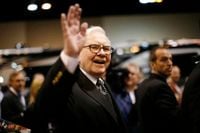Warren Buffett, the renowned investor and CEO of Berkshire Hathaway, is stepping down after leading the company through an extraordinary period of financial success. From 1965 to 2024, Berkshire Hathaway stock has achieved an astonishing return of 5,502,284%, dwarfing the S&P 500's return of 39,054% during the same period. This remarkable performance translates to a compound annual growth rate of 19.9% for Berkshire compared to the S&P's 10.4%.
Buffett made the announcement during Berkshire Hathaway's 60th annual shareholders meeting on Saturday, May 3, 2025. He expressed his belief that it was time for Greg Abel, currently the vice chairman of Berkshire Hathaway, to take the helm as CEO. "I think it's the time has arrived where Greg should become the chief executive officer of the company at year-end," Buffett stated, highlighting his intention to inform the board of directors of his recommendation.
Following Buffett's announcement, Berkshire Hathaway's board unanimously approved the transition on Sunday, May 4, 2025. Abel is set to officially assume the role of CEO on January 1, 2026, while Buffett will remain as chairman of the board. During the meeting, Buffett also addressed the company’s substantial cash reserves, which totaled $347.7 billion at the end of the first quarter. He explained his strategy of maintaining a significant cash pile, stating, "We would rather have conditions that have developed where we would have, like, $50 billion or something like that. But that just isn't the way the business works."
Buffett's legacy at Berkshire Hathaway is marked by unparalleled resilience. Over the past 60 years, the company has only fallen behind the S&P 500 in two of the 13 years when the index closed lower. His long-term perspective and strategic investments have positioned Berkshire as a leader in various sectors, including insurance, utilities, and consumer goods.
In a related philanthropic effort, Buffett's Susan Thompson Buffett Foundation has stepped in to support Kenya's cash-strapped public health sector with a grant of Sh3.8 billion (approximately $34 million). This funding comes at a critical time as the Kenyan government faces significant budget shortfalls due to cuts in foreign aid from the Trump administration. The grant will be directed to the State Department of Medical Services, representing 18.1% of the department's projected budget for the upcoming fiscal year.
The foundation, named after Buffett's late first wife, has historically supported reproductive health initiatives, including access to contraception and safe abortion services. This recent grant underscores Buffett's commitment to addressing global health challenges, particularly in regions affected by reduced aid.
In the wake of the Trump administration's sweeping review of U.S. foreign aid, many health programs across Africa have experienced drastic cuts. The World Health Organization has warned that several countries, including Kenya, could soon run out of essential medical supplies, including HIV drugs, due to the funding freeze. The Kenyan government has indicated it needs Sh24.9 billion to replace the lost U.S. funding.
Buffett's philanthropic efforts, including his substantial contributions to the Gates Foundation, have made him a pivotal figure in global health initiatives. To date, he has donated approximately $43 billion to the foundation, which focuses on reducing poverty and improving healthcare worldwide. As he plans to donate 99.5% of his remaining wealth, currently valued at over $161 billion, to a charitable trust managed by his children, his influence on philanthropy is expected to continue.
Despite his criticism of some of Trump's economic policies, Buffett remains a powerful voice in the investment community. During the recent shareholders meeting, he expressed concerns over tariffs, stating, "Trade should not be a weapon." His insights reflect a belief that economic policies should foster growth and cooperation rather than division.
As Buffett prepares to pass the reins to Abel, he leaves behind a legacy of innovation, resilience, and philanthropy. His vision for Berkshire Hathaway has not only transformed the company into a financial powerhouse but has also set a standard for corporate responsibility and charitable giving.
In conclusion, Warren Buffett's decision to step down as CEO marks the end of an era for Berkshire Hathaway, but his impact on the company and the world of philanthropy will undoubtedly endure. With Greg Abel poised to lead the company into its next chapter, investors and stakeholders alike are eager to see how the transition unfolds and what new strategies will emerge under Abel's leadership.

